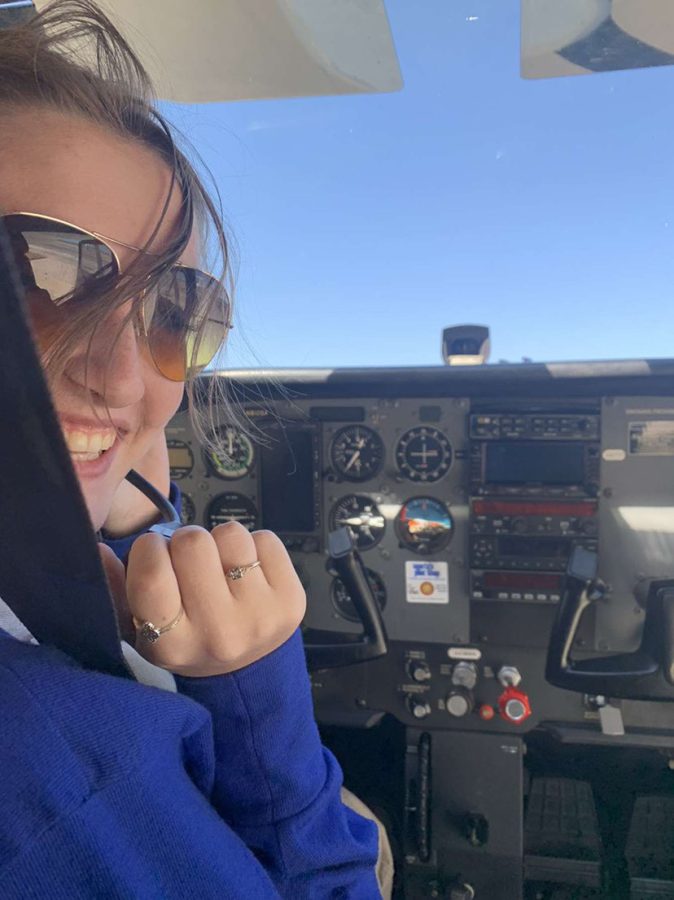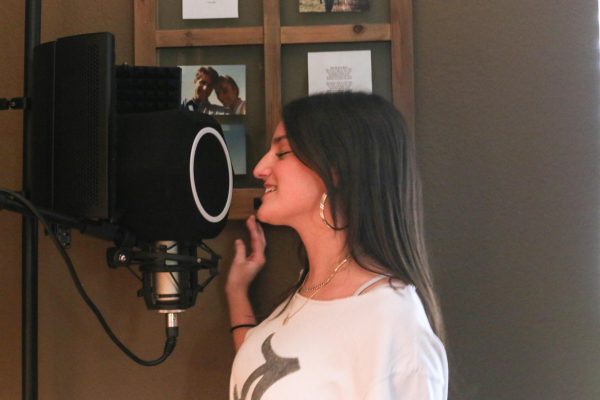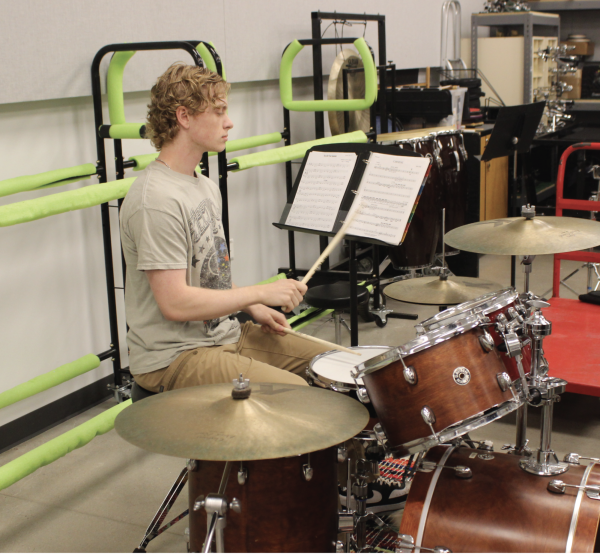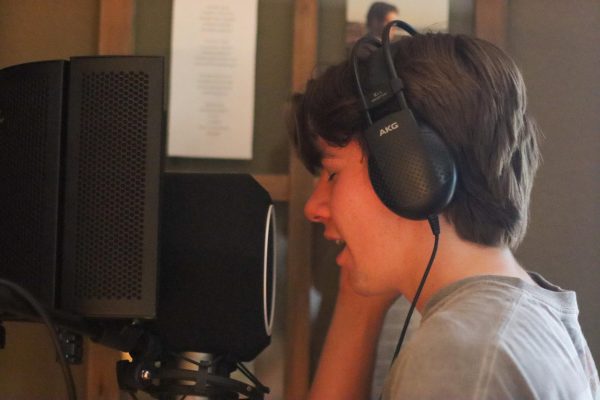Soaring through the skies towards a lifetime in aviation
Photo courtsey of Anni Dotzenrod
FLYING HIGH: Senior Anni Dotzenrod sits in the pilot seat of a plane for training. She has been working to earn her private pilot license, which requires 40 hours of practice.
Overlooking the vast layer of clouds below her, senior Anni Dotzenrod shifts the control stick centered within the plane’s dashboard. She begins the exciting, yet risky, descent towards a safe landing, already envisioning her next trip in the skies.
Dotzenrod has been working towards her license for the past two years, steadily putting in the required 40 hours to receive her private pilot license (PPL), the first of three tiers of licenses. This license level allows for flying basic planes, meaning single-engined vehicles, usually somewhat limited in function. Though the prospect of taking to the skies can be a pleasurable hobby for many, it can also serve as a massive milestone on the long path toward a lifetime career in aviation.
“Settling down for a job the rest of my life doesn’t really appeal to me,” Dotzenrod said. “The benefits of being a pilot are really good for someone with those sentiments.”
As someone uninterested in the mundane nature of living a nine-to-five work routine, Dotzenrod has found a home with the Young Eagles Academy. The academy is a prominent aviation program founded by the Experimental Aircraft Association, dedicated to helping today’s youth begin their journeys towards piloting across the nation.
“The sooner you decide you want to become a pilot and join an aviation program, you’ll receive much more benefits down the line,” Dotzenrod said. “The aviation industry is all about seniority and experience.”
It’s no surprise that learning to soar above the clouds takes time and dedication. Still, the financial undertaking associated with the activity can be impossible, with a cost around $17,000 on average to earn a PPL, according to Texas State Aviation. To counteract this issue, programs such as the Young Eagles Academy offer a free introductory flight, an exceptional offer nearly 2.3 million young people have taken over the thirty years of the program’s existence.
“I think the scariest part of becoming a pilot is the commitment to the activity,” Dotzenrod said. “It’s kind of your entire life you have to devote for a few years.”
The first flight, an experience that judges whether a person genuinely enjoys the experience of being in the sky, is much more critical when deciding to be a pilot, as training can be a tremendous yet laborious aspect of the person’s life.
“Getting experience in the air is important,” Dotzenrod said. “The idea of being a pilot and actually being in control of a plane are two very different things.”
Matthew Caruthers, a junior at Bowie and a close friend of Dotzenrod, flew with her earlier this year in an hour-long discovery flight from an Austin aviation airport. Discovery flights allow for the maximum passenger of one person within the basic aircraft, so long as all the required licenses are put in place.
“I was extremely nervous at first,” Caruthers said. “I didn’t really know what I was getting myself into, and the plane’s constant shaking didn’t help.”
Smaller planes are commonly more susceptible to heavy turbulence, making piloting them a severe focus-driven activity.
“I’ve never seen Anni so focused and in the moment than when she was piloting,” Caruthers said. “She seemed so confident and that probably made me feel a lot better.”
The balance of tackling the busyness of a high schooler’s schedule while still maintaining a steady path toward becoming a pilot is not a feat to take lightly, especially as Dotzenrod actively participates in the intense Band program at Bowie.
“We couldn’t be prouder of Anni,” Dotzenrod’s mother, Michelle Dotzenrod said, “She’s worked so hard to get to where she’s at with band, piloting, and academic work.”
Anni is heavily committed to the Bowie band program, having climbed her way to a leadership position during her four years at the school while simultaneously piloting.
“It’s definitely a lot of time management,” Anni said. “I wouldn’t trade either program for the other though.”
Though Anni has only been flying for a short while, her passion for the occupation is very telling. High school students rarely have a career plan laid out for themselves. Still, Anni has proven proficiency in piloting and laying the groundwork for her life-long professional ventures, according to her advisors at the Young Eagles Academy.
“I’m really grateful to be able to pursue something I enjoy so much and turn it into a life-long career,” Anni said.
Your donation will support the student journalists of James Bowie High School. Your contribution will help cover our annual website hosting costs. Any contributions made through this service are NOT tax deductible. If you would like to make a tax deductible donation OR to subscribe to our print edition, please contact us at [email protected].








